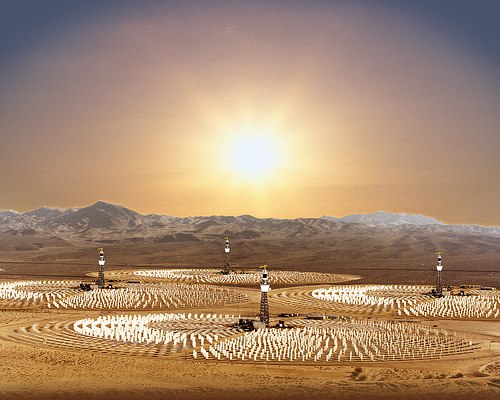Solar Energy Momentum Building in the Middle East

Local banks have come together to finance Qatar’s first solar-grade polysilicon production plant, a planned $1.1 billion, 8,000-metric-ton facility being built by Qatar Electricity and Water (QEWC) and Qatar Solar Technologies (QSTec), a joint venture of the Qatar Foundation that supports efforts to transform the Gulf Coast country’s economy from a carbon-based to a knowledge-based one.
Doha-based Masraf Al Rayan secured financing for the QSTec-QWEC polysilicon plant in Ras Laffan Industrial City, Stage One of which is expected to be completed in the second half of 2013. “The signing of this deal with Masraf Al Rayan is a significant milestone for QSTec and a major step in the development of a new industry for Qatar — the solar Industry,” stated QSTec CEO and Chairman Dr. Khalid Klefeekh Al Hajri.
Momentum for solar energy is building across the Middle East, as local populations continue to grow rapidly, putting greater demands on water and other scarce natural resources. At the same time, more of an environmental ethic that places greater emphasis on quality of life and preserving biodiversity and the physical environment is taking root.
Gulf Coast and Middle Eastern countries have signed on to international accords to reduce CO2 and greenhouse gas emissions and environmental degradation by developing more sustainable economies that place greater value on the natural environment and ecosystem services. Gulf Coast oil and gas exporters, including Qatar, the United Arab Emirates, Oman, Bahrain and Saudi Arabia, have announced that they are increasingly envisioning a future in which solar PV and other forms of renewable energy play a greater role in their economies.
Less oil-rich Middle Eastern as well as North African Islamic countries see solar and renewable energy resources both as a means to economic development and environmental conservation. Jordan and Morocco, for instance, are attracting investment and ramping up solar, wind, and other renewable energy project development.
The agreement between QSTec and QEWC is seen as a key building block in developing a foundation for a solar photovoltaic (PV) industry supply and value chain that could result in solar PV installations across the region and beyond.
“The interest in alternative energy sources and solar energy in Qatar is present and growing. The development and advancement of solar cell technology and the related industry should be the cornerstone for the future strategy on alternative energy resources,” commented QEWC general manager Fahad Al Mohannadi.
Qatar’s solar energy ambitions include using solar energy to realize the aim of making the stadiums being built for the 2022 World Cup, which will be held in Qatar, carbon-neutral.
You can return to the main Market News page, or press the Back button on your browser.

